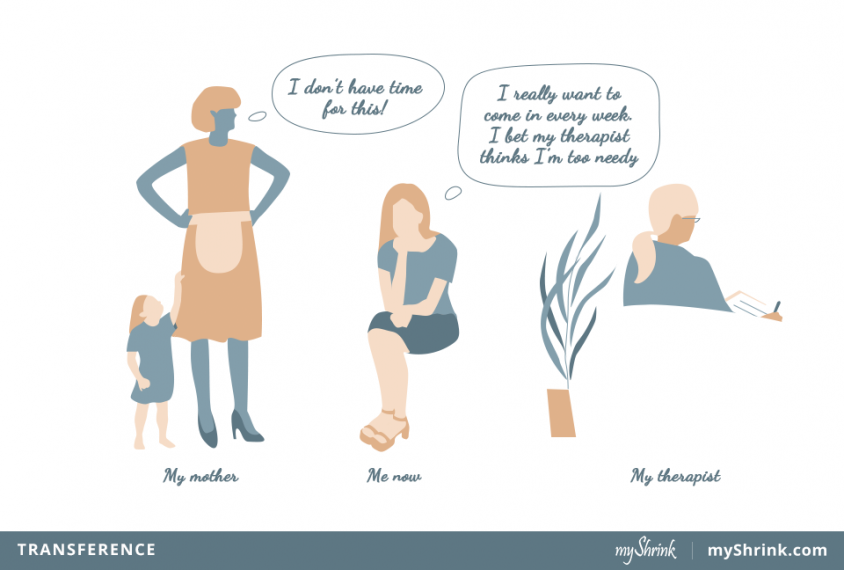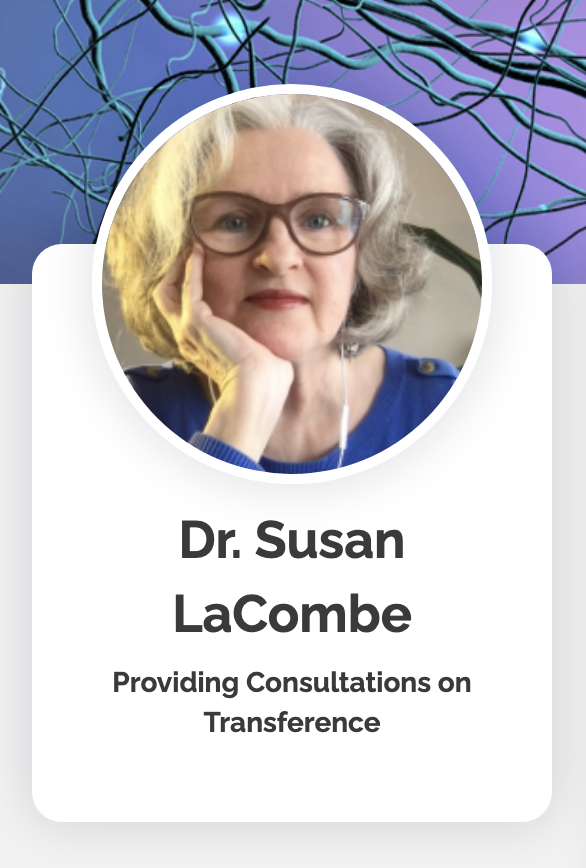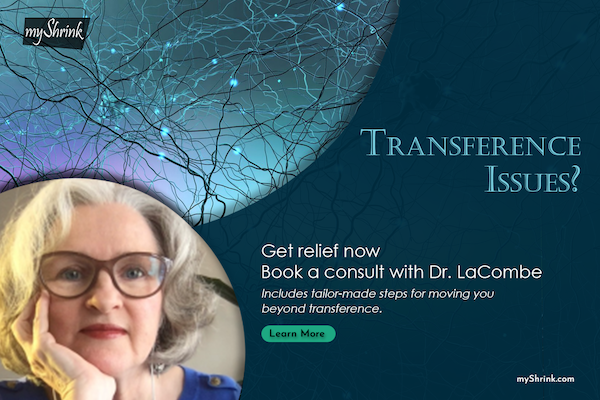Looking for examples of transference to answer an age old question: "Are my feelings towards my therapist real or not?" Maybe these transference stories will point you in the right direction.
Hi, I'm Dr. Susan LaCombe, a psychotherapist/psychologist with almost 30 years of clinical experience.
In 2006, I wrote an article online on dealing with transference. Soon after I started receiving dozens of heartfelt messages from other therapists' clients. These were examples of 'transference horror stories' . . . of clients suddenly being referred to other therapists and being abandoned. Clients spoke of being in therapy for years struggling through their transference with little assistance on how to shift it and feeling little option but to continue with their therapist.
These stories inspired my interest in understanding transference from a neuroscience perspective and finding faster ways to resolve it that worked for the long-term.
Handily, the solution was arrived at from an unlikely source.
Transference examples: a short list
Romantic Transference
I love my therapist. It feels so real I fantasize that being with him would mean my life would finally be complete. (Jennie's example)
Eroticized Transference
I'm in love with my therapist. I want to make love to her and think about it all the time.
Idealized Mother Transference
I love my therapist like a Mother. It feels so warm and safe being in the session with her; I don't want it to ever end. (Richards's example) (Just me)
Idealized Father Transference
My therapist is like a father I never had. He's so strong and sure of himself. I want to absorb all his goodness.
Negative Transference
My therapist is so cold and distant. I don't think she cares at all. I'm just a number to her. (Tanya's example)

Life lessons start early. This little girl realizes she's a source of irritation to her mother. When repeated many times an habitual emotional reaction will start to appear in other important relationships. Even age-appropriate behavior in a toddler is too much to deal with when Mom (or Dad) is stressed, lacking in support or triggered by his/her own childhood experiences.
Part 2 of a 4-Part Article
Part 1: What is transference?
Part 2: Transference Examples from Therapy (you're here)
Part 3: How to Deal with Transference
Part 4: Tips for Dealing with Transference (Q&A;s)
Related: What is Countertransference?
Transference Example #1: Jennie

Dr. Susan "Shrinklady" LaCombe
By: Psychologist Dr. Susan LaCombe
Updated: August 3, 2023
Jennie was feeling desperate. She hadn’t bargained on therapy creating more problems than she had when she began. At times it was all she thought about, and she didn't think she could hold it in any longer.
Her husband of 20 years found her preoccupation with therapy a little confusing - yesterday he remarked offhandedly that he didn’t see the need for her to get dressed up before her appointments.
She knew it wasn’t right to keep him in the dark - she was so embarrassed.
That wasn’t the tough part though.
The truth was that she was in love with someone else - someone she couldn’t have. Someone she couldn't stop fantasizing about.
Her therapist.
And things were getting out of hand.
Last night she couldn’t sleep and found herself doing something she wasn’t proud of…she Googled him. Now she knows where he lives, that he has a wife and two kids etc. Though she felt like a stalker, she hoped that would be the end of it.
But knowing about his private life didn’t help - it didn’t dampen her feelings for him one bit. And the thing is, she hasn’t even told him how she feels. She’s afraid he’ll refer her to someone else.
"He’s such a softie..even with his big belly..
I want him to hold me so badly."
Transference in psychoanalytical therapy
Jennie wasn't aware that experiencing feelings of attraction was common in long-term therapy. Called 'transference', it encompasses pretty much any feelings that get stirred up regarding your therapist.
Jennie's also in luck because there's a good chance her therapist will be prepared to work with her on the transference.
It didn't used to be the case.
In traditional psychotherapies many clients suffering from transference had no idea what was really going on. Unless or until they finally disclosed these feelings to their therapist (or a trusted friend) they were effectively on their own.
And even if they chose to bring the subject up in therapy, they often had a hard time getting a straight answer.
You see, the profession harbored a distanced, highly analytical "left brain" bias**. The equal importance of the right brain and nervous system had not yet been added to the profession's theoretical toolbox, let alone therapists' clinical training.
Indeed, typical psychoanalytical approaches advised the therapist to say as little as possible about transference (to avoid pulling the client out of the process).
In fact, psychoanalysts were discouraged from saying anything at all, because their was to heighten the transference. This was to make it easier for both the therapist and client to see it.
The crucial limitation to this approach was its insistence on intellectual analysis of the transference. The client was supposed to logically "think through" the experience and see the transference for what it was.
Making himself or herself emotionally available was the farthest thing from the therapist's mind, and the idea to be in resonance with the client's nervous system was a development still years in the future.
As you can imagine, this left clients helplessly drowning in early undefended child-like states with no guidance how to save themselves.
The solution back then was simple...see your therapist more often...maybe twice a week for starters, sometimes for years on end.
Dependency on your therapist is scary for various reasons
Now I sincerely believe that in many cases this vulnerability was not taken advantage of. *
For many clients, where I feel the real risk is finding yourself somewhere in-between.
That is, you're not with a therapist who's out to take advantage of you nor are you with a therapist that's well versed in dealing with transference.
- For instance, imagine being with a therapist who is 'fanning the flames' of their own ego by allowing the transference to continue without guiding you through it.
- Or possibly an incompetent therapist who tells you to set this "transference business" aside - including all the feelings associated with it - and get down to the business of why you initially came to therapy.
As you might guess, this latter scenario is modeling "there's an elephant in the room and we won't speak about it" mentality.
Not to mention the lost opportunity.
*The reality though is that boundary violations do continue. I know because myShrink members continue to write me about them. For many these clients, the transgression continues to haunt them years later.
Dependency is scary, period.
Even if the therapist is top notch, from the client's perspective dependency is frightening. (See Debra and others)
This is why classic psychoanalysts were required to undergo their own personal therapy as part of their training.
And while I personally don't align myself with these methods (I've used other solutions for transference), they were right that facing and processing your transference paid huge therapeutic benefits.
Yet for years transference has been shrouded in mystery.
Only recently has the subject been openly discussed and recognized by the wider mental health community as a normal, instrumental part of therapy.
In fact, the Internet has been godsend in this regard. Folks in therapy can now connect with others going through the same process.
Even so, most of those going into therapy have no idea that transference can emerge without warning.
(Which is one of the reasons I teach the use of tools to help deal with these fears.)
If you're resonating my writing and are suffering through a transference, check out my program Therapy Bootcamp to find lasting resolution.
Is transference a good thing?
Transference can completely transform how you feel about yourself because it's often rooted in our earliest, often pre-verbal, emotional development.
Transference works when you ...
- Have the personal resources to continue your therapy;
- Have a therapist who seems attuned to you;
- Have a therapist that makes you feel safe, and,
- You know how to make the most of your experience . . .
I'd call it the best kept secret of therapy!
That means, resolving your transference majorly transform how you experience yourself - for the good.
It draws it power from the fact that it enables you to access an area of the brain that's hard to get at through to talk therapy alone.
Some remain in their transference - forever!
Key point: Successful resolution of a transference requires key conditions being met, the most important being the interactive skills of an attuned therapist.
What kinds of changes can you expect?
Well, transference is triggered by the emotional drive to belong and feel whole, and that can cover a lot of ground.
This is why resolving the transference can benefit you tremendously if you feel less worthy than others, less emotionally capable, or less entitled to have what you want or need.
I know you might not be there yet . . . but just imagine how your life would change if you could experience the world as confidently as you see others experiencing it.
More transference examples
As mentioned, transference occurs when you unconsciously 'transfer' (attribute), the feelings, memories and desires you experienced in your early important relationships to your therapist.
Therapy heightens this unconscious propensity for bringing your feelings into the therapeutic relationship.
Feelings are intensified because therapy happens privately, within strict personal boundaries, and where the conversation is typically one way.
You see, there are no distractions to dilute how you experience your therapist. Indeed, it can feel as though your feelings are caused by the therapist.
These transference feelings can take many forms apart from a romantic or erotic attraction. For example, you might feel as dependent as a child looking forward to seeing your Mom).
Transference Example #2: Richard
Richard feels his therapist is like a mother to him. He loves going to his therapy sessions. It’s like going back to a home he never had.
Her office even has a smell that he can detect just walking down the hall towards her door.
He yearns to be hugged by her but he’s afraid she’ll think it odd if he asks.
The hardest time is the end of a session, knowing it’s a whole week before he'll see her again.
Transference Example #3: Tanya
Tanya is far from feeling attracted. In fact, she’s considering leaving therapy altogether . . . for many reasons.
For one, she finds her therapist cold and distant. For another he doesn’t always answers her questions, and he then asks why she wants to know.
And she hates when he writes his notes when she’s talking.
The worst is that she distrusts his sincerity when he says he cares about her well-being. She had no idea that she would develop such a strong reaction.
In her mind, she has countless arguments with him - that she never brings to light.
You see, she’s done enough research to know that not all therapists understand transference (or can handle it).
She wonders whether her feelings are coming from transference or whether this guy’s just not emotionally open.
It’s so hard to tell.
Ironically, transference had become a problem in itself, in addition to her other issues.
Tanya has an inkling it’s related to feelings for her father, whom she found overbearing.
But if she terminates her therapy she’ll probably never find out.
Indeed, for many folks it’s only after they successfully resolve their transference feelings (and experience themselves in new ways) that they really grasp the power of it.
So Tanya’s wondering how “working through transference” will help her when her therapist shares so little emotionally.
To complicate the situation, she also knows that not everyone gets through their transference successfully.
New! Rate this article (anonymously)
Was this article helpful to you? Let others know.
Thank-you in advance for your time!
Shrinklady
Author's Note
For a lucid discussion on identifying transference and countertransference apart from the reality of the context enjoy reading:
Robert King and Tom O'Brien, Transference and Countertransference: Opportunities and risks as two constructs migrate beyond their psychoanalytic homeland. PSYCHOTHERAPY IN AUSTRALIA • VOL 17 NO 4 • AUGUST 2011
"There may well be an element of transference in every emotional response. However, the size of that element is often difficult to determine." [Italics added] pg. 14

Debra, Traverse City, USA
Became dependent on my therapist so quickly
I find transference frightening! I don't know how I can become so dependent on a therapist, so quickly! I count the days, even hours until I can see him and talk about my issues...it scares me!

Shrinklady
You're absolutely right Debra . . . transference can be very scary. It's good to hear you have that an awareness of it. I think that's half the work.
The kinda cool part about it too is that if this is happening with your therapist, you can be almost assured that the same dynamic is playing a role in your life . . . even in ways you might not imagine at this point . . .what I mean is, won't it be great when it's no longer interfering with your life.
That's certainly been my experience. I've been quite surprised--and pleased--with the changes I've made. I could never have predicted them based on the work I did.
So, I wish the same success for you.
All the best,
Shrinklady

Attachment Girl, The Psych Cafe
I struggle with feeling dependent on my therapist.
I'm another one struggling with an intense transference relationship, but am grateful that my therapist and I have been really open about it. While keeping very safe boundaries in place, he has been open to hearing about all my feelings and working it through. All that said, it can be incredibly painful and frustrating.
I know one thing that I have struggled with the most is feeling like I am so dependent on my therapist. There is a book that has really helped me understand what is going on in the relationship and the way in which it is healing that I would like to recommend for anyone dealing with this. the book is The General Theory of Love by Thomas Lewis.

Shrinklady
Thanks Attachment Girl for sharing this and your book suggestion. I took a boo at the book and as I was skimming through, thought it looked pretty good. In fact, I will put it forward as a selection for my study group.
I stumbled upon a quote from the book..."When an emotional chord is struck, it stirs to life memories of the same feeling." (pg. 130) It seemed like a good match for transference.
The quote made me think about boundaries and I'm so glad you referred to them. In my view, good boundaries are essential for the full working through of transference reactions.
Not every one might appreciate the idea around boundaries in the context of understanding transference, so let me briefly add this. When a therapist recognizes that the client's anger is coming from another place he or she does not take it personally...and is able to see it for what it is...while maintaining a solid connection. This is how boundaries are maintained and the healing occurs.
In other words, the brain is having a new experience.
You had mentioned struggling with feelings related to the dependency on your therapist. I can understand that, in a word, you've done this before (in infancy) and it didn't quite work out...so it makes it all the more scary today.
As you have probably read, if we don't have a chance as an infant to feel secure and safe with our caregiver then in therapy we will revisit our yearning to feel dependent upon our therapist.
In other words, "leaning on" our therapist is how we heal.
As you proceed in therapy, hopefully you will discover that it is through this process you become more fully who you are. And, just like an infant, when you get enough of your needs met, you will flourish!
All the best on your journey,
Shrinklady
P.S. the "leaning on" phrase came from a book recommended to me by Dr. Carole called Lean on Me by Marion Solomon. (The same author who co-wrote 'Parenting from the Inside Out'.
I received a replay from Attachment Girl and here's what she said:

Attachment Girl
Shrinklady, Thanks so much, that all made a lot of sense. And thank you so much for the book recommendation. I read Parenting from the Inside Out which my therapist recommended when I asked for a book on attachment and it had an incredible impact on me. I will definitely be reading this one.
I hope your study group enjoys A General Theory of Love. My therapist actually read it after I had told him about it and we've discussed it extensively as it has really resonated with the work we're doing. Although, he did say he was very bummed out while reading it because there was another book he didn't get to write. : )
Thank you so much for being such a help on my journey.
Part 1 - What is transference?
Part 3 - How to get over transference sooner





